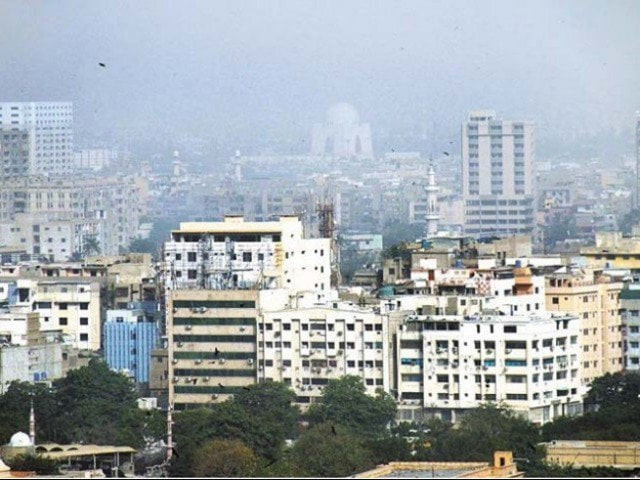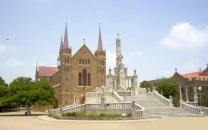Apex court permits construction of six-floor buildings in Sindh
Permission strictly subject to ensuring availability of proper water supply, sewerage system

PHOTO: FILE
A three-judge bench, headed by Chief Justice of Pakistan (CJP) Mian Saqib Nisar, however, directed the builders and developers to ensure that no units will be booked beyond this limit in their projects.
Also comprising justices Faisal Arab and Sajjad Ali Shah, the bench was hearing an application filed by various builders' associations seeking review of the court's May, 2017 order.
The apex court directed the association to write a proposal on installation of desalination plants in each multi-storey project in order to resolve the problems relating to sewage.
In May last year, the apex court had restrained the Sindh Building Control Authority (SBCA) and cantonment boards from issuing building approval plans for new high-rise and multi-storey commercial and residential projects without the availability of proper water supply and sewerage systems.
These directives were issued in a case relating to non-availability of potable water and deteriorating sanitation conditions in Karachi and the rest of the province. Subsequently, the SBCA stopped issuance of new building approval plans for skyscrapers.
At the outset, the CJP remarked that the court will protect the fundamental rights of the citizens and will not let such rights be violated.
CJP comes down hard on authorities, says SC will deal with Karachi water tanker mafia
Barrister Abid Zuberi, who represented the Association of Builders and Developers, said that 308 projects had been stalled due to a ban imposed by the SBCA on the court's order, which was causing huge losses to the developers.
On the court's query, he informed it that 20 of these projects fall in the high-density zone of the city.
Zuberi contended that there was no shortage of water in the city, but there was instead mismanagement of water distribution, due to which the residents were forced to get water through tankers at high costs of upto Rs4,000 per tanker.
On the court's query to name the people who were behind the mafia running the water tankers, Zuberi said he buys water from water tankers run by the National Logistics Cell (NLC).
Businessmen protest against ban on high-rise buildings
Justice Nisar remarked how any action could be taken if those involved in the practice would not be named.
A lawyer, Masroor Ahsan, said every influential MPA was behind the water hydrants.
The CJP asked him to give names and evidence so that action could be ordered against them. He observed that the court could not order the shut down of an industry which provided employment to many people.
Justice Nisar asked Zuberi to hold a consultation and inform the court under what conditions high-rise buildings' construction could be allowed in the areas which had adequate quantity of water.
He also asked another senior lawyer, Mujeeb Pirzada, to assist the court in identifying the people behind the tankers' mafia so that action against them could be ordered.
SC dismisses ABAD's request to lift ban on high-rise buildings
Mayor Wasim Akhtar, who appeared on the court's notice, informed the judges that water was being sold from illegal water hydrants against bribe. He added that the city's sewerage system had almost collapsed, as illegal encroachments and buildings had been constructed on the drains.
"Most of this was done during the tenure of your party," remarked the CJP, asking the mayor to assist the court on how to resolve these issues.
Justice Nisar told the mayor he was an elected representative, therefore, should make suggestions on public issues apart from politics.
The CJP also asked the mayor to go through the report of the commission and cooperate with it during implementation proceedings. He asked him whether the residents of Karachi were satisfied with the state of affairs, to which the mayor replied in the negative.
SC maintains ban on construction of high-rises
The top judge told Akhtar to work with the provincial government as a team and rise above political differences.
To this, the mayor undertook to work for the resolution of water and sanitation related issues above political differences with the provincial government.
Advocate Pirzada said that the desalination plant of the Defense Housing Authority (DHA) was lying non-functional.
CJP Nisar said he had received a suggestion that sewerage-related problems could be resolved if the provincial government and builders jointly install desalination plants.
Barrister Zuberi said the builders were ready for the installation of the desalination plants. To the court's query, he said the construction of up to eight floors in high-rise projects should be allowed.
However, the CJP ordered that the builders could construct only six floors in the projects strictly subject to ensuring availability of spaces for parking and other amenity purposes.
Apex court orders lab tests of packed milk in Sindh
He ordered the builders to strictly book the units till the sixth floor. Otherwise, the CJP warned that the project will be cancelled and the money will be returned to the clients.
Advocate Ahsan Iqbal pointed out that the officials were still allowing construction of high-rise buildings in Clifton and DHA in violation of the stay order granted by the court.
The CJP asked him to submit documents and evidence so that action could be taken against the builders, who will be sent straight to jail from the court in the presence of the media.
The next hearing was fixed after two weeks at the SC's Karachi Registry.



















COMMENTS
Comments are moderated and generally will be posted if they are on-topic and not abusive.
For more information, please see our Comments FAQ